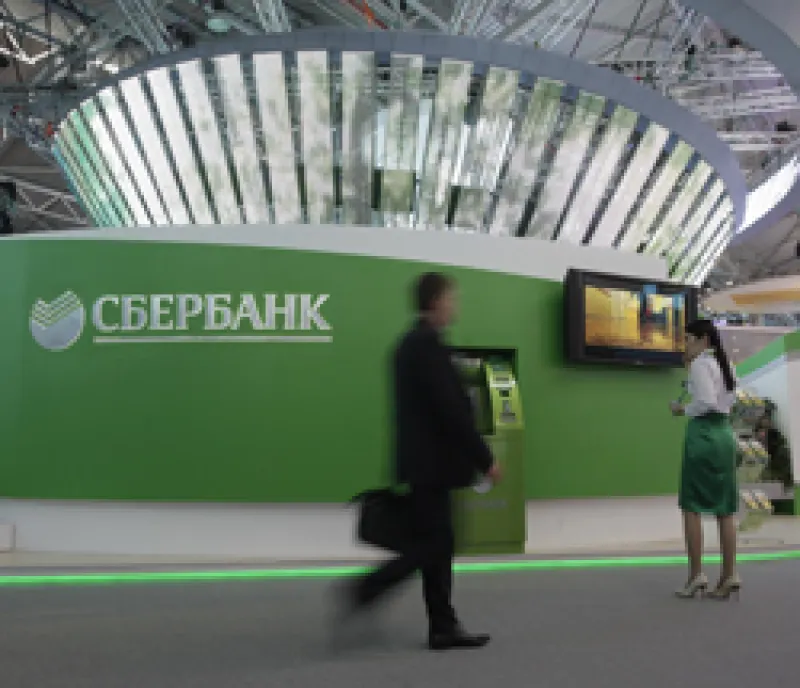The Russian government has promised an ambitious new privatization program over the next few years that could sell off $30 billion worth of shares in state companies. But the investment banks flogging that equity will be ... state companies.
That is the implication from the breaking news that Sberbank, the former Soviet savings monopoly that is Russia’s largest bank by far, will acquire the until-now privately held Troika Dialog. Troika’s CEO and biggest shareholder, Ruben Vardanian, has hinted at a deal with the state-owned colossus for months. Now the Russian press and foreign wires are bubbling over with leaked details. Sberbank will pay $1 billion for 80 percent of Troika, according to Moscow business newspaper Vedomosti. Both sides are so far withholding official comment.
Sberbank is playing catch-up in the investment banking space to number two state rival VTB, which has built its VTB Capital subsidiary into Russia’s dominant underwriter over the past three years. VTB Capital grew by poaching dozens of financiers from the Moscow offices of Deutsche Bank and other multinationals. Sberbank seems to have chosen acquisition. Troika, founded in the early 1990s by Vardanian and two American partners who have since left the business, has long been the stock broker of choice for international investors in Russia. It is also the country’s biggest mutual fund manager and among the top half dozen equity and debt sponsors.
The acquisition, which Sberbank’s board is expected to approve later this month, will make a rich man of Vardanian, 42, who heads the management group that currently controls 64 percent of Troika’s shares. It also represents a healthy payday for South Africa-based Standard Bank, which bought the remaining 36 percent for about $300 million at the depths of the financial crisis in March 2009. Sberbank will buy out Standard entirely, according to press reports.
But it is hard to think that the deal will add competitive vitality in Moscow, which the Kremlin aims to turn into an “international financial center” over the next decade or so. Issuers and investors alike benefited over the years from the rivalry between Troika, Renaissance Capital and a few global banks like Deutsche and UBS that built extensive local presence in Russia. RenCap, while still privately co-owned by New Zealand-born founder Stephen Jennings and oligarch Mikhail Prokhorov, is focusing on expansion in Africa and other frontier markets outside Russia. Book running by VTB Capital has become a de-facto necessity for any sizeable debt or equity issuer now, supplemented by a global house to market to international investors. Competition from Sberbank is better than no competition. But a choice between two state bureaucracies with opaque backstage political agendas is worse than a choice between hungry private players forged in the crucible of Russia’s wild 1990s.
Private enterprise has already been marginalized in Russian commercial banking. The top five players are all state-owned, Sberbank and VTB followed by Gazprombank, Rosselkhozbank and Bank of Moscow (which VTB looks set to take over after the firing of Moscow Mayor Yuri Luzhkov last autumn). Kremlin control did lend the financial system stability during the 2008-09 crisis, compared to Eastern European nations left at the mercy of foreign-owned banks. But it has also cemented an ethos where distribution of capital is assumed to depend as much on who you know as whether you can pay back. Vardanian himself lamented this situation in an unusually candid interview with Vedomosti last year. “The crisis showed that we have no capitalism,” he said. “What we have is a sort of pseudo capitalism.”
Sberbank has benefited from progressive leadership from German Gref, a former economics minister who took over as CEO there in late 2007. But it will have to prove it is more than a pseudo-capitalist in managing Troika. Meanwhile Russia, Inc. faces a dilemma. Two of the marquee enterprises in the new privatization campaign are none other than Sberbank and VTB. Who is going to advise them?






